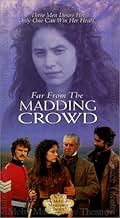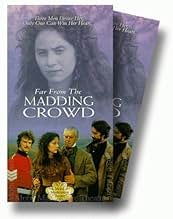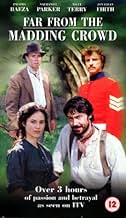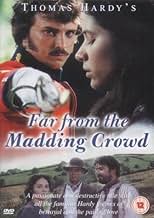A vain, pretty girl has recently taken over her uncle's farm. Her independent, naïve personality leaves her torn between the three men who wish to marry her.A vain, pretty girl has recently taken over her uncle's farm. Her independent, naïve personality leaves her torn between the three men who wish to marry her.A vain, pretty girl has recently taken over her uncle's farm. Her independent, naïve personality leaves her torn between the three men who wish to marry her.
- Won 1 BAFTA Award
- 2 wins & 2 nominations total
Featured reviews
I just happened to tune into this production on my local PBS station a few years ago and my immediate reaction was "Oh no, not another boring and stuffy Masterpiece Theatre production!" Well, fortunately I was totally unfamiliar with the plot of this film (which is based on the classic Hardy novel) and within minutes became completely riveted to my television when the character of Sergeant Troy appeared on the screen. Like Bathsheba, the female lead, I was completely taken in by Troy as portrayed by the actor Jonathan Firth and then horrified as to the events that followed. Again, this production caught me totally by surprise and it had some of the best acting scenes I have ever encountered .. a far cry from those period pieces where emotions are kept below the surface. That kind of acting is tiresome. The acting here is filled with alot of passion, emotion, and sparks. Best scene: Troy and Boldwood fighting over Bathsheba in the courtyard. It is shocking, despicable, heart-breaking, and sexy all at the same time! Compliments to all of the actors in a most underrated production.
10reg-4
As a native of 'Hardy country', I feel I have a duty to comment on this production. I, as with many other people in England, eagerly awaited this series, and I have to say I was not disappointed. As us English have come to expect from our television dramas, the locations and costumes were fantastic, but this has the added bonus of an extremely accomplished screenplay. Also, the acting is superb. The accents, one of the major stumbling blocks to American acceptance, are accurate enough to satisfy English viewers (including those with the same accent!), while at the same time allowing American viewers to understand the dialogue. Particular praise should, I feel, go to Nathaniel Parker, who has achieved something very spectacular, in eclipsing Alan Bates' 1967 performance as the faithful shepherd Gabriel Oak. All in all, a feast of Wessex magic which can be enjoyed by all. Nice one.
I finally saw the 1967 version of Hardy's story, and while I thought it had excellent performances, the 1998 version is more satisfying. I've always liked both Alan Bates and Nathaniel Parker, but I think I'd have to give the latter the nod for his portrayal of the upright, conscientious Gabriel Oak. Nigel Terry is superb as the tragic Mr. Boldwood; his entire demeanor commanded more sympathy from me than did Peter Finch's portrayal -- you simply ache for the poor fellow when he's trying to gain even the slightest bit of encouragement from Paloma Baeza (who is exceptional as Bathsheba). I also thought this version was brighter and warmer than the visually gloomy, bleak 1967 version. (Well, perhaps that's really what Wessex looks like.) I realize this isn't exactly a happy tale, but it's nice to see SOME upbeat moments and sunshine once in awhile. All in all, a very satisfying performance -- a few hours well-spent.
10Jen-49
I didn't think it was possible. I'd always loved the 1967 Julie Christie version with Alan Bates as the upright shephard Gabriel Oak. But having seen this version, then reading the book (amazingly readable) and re-watching the 1967 version, I definitely give my vote to Nathaniel Parker as my favorite Gabriel. (OK, so he's even cuter than Alan Bates circa 1967, so that part's a no-brainer!)
Seriously, comparing the two versions and the book (which is more Gabriel Oak's story), it is obvious how the Alan Bates part in the 1967 version was butchered to create more screentime for Terrance Stamp and Peter Finch as well as Julie Christie. It also became apparent to me that Julie Christie was too old for the part. Paloma Baeza is much more realistic (and likeable) as the headstrong, impetuous Bathsheba. I also liked the fact that there seemed to be more passion seething just beneath Gabriel Oak's surface veneer than in the 1967 version. The final scenes where she accepts his proposal and post-wedding are a lot more passionate (still without a single kiss, alas!) than the cool (dispassionate) ending of the 1967 version.
Seriously, comparing the two versions and the book (which is more Gabriel Oak's story), it is obvious how the Alan Bates part in the 1967 version was butchered to create more screentime for Terrance Stamp and Peter Finch as well as Julie Christie. It also became apparent to me that Julie Christie was too old for the part. Paloma Baeza is much more realistic (and likeable) as the headstrong, impetuous Bathsheba. I also liked the fact that there seemed to be more passion seething just beneath Gabriel Oak's surface veneer than in the 1967 version. The final scenes where she accepts his proposal and post-wedding are a lot more passionate (still without a single kiss, alas!) than the cool (dispassionate) ending of the 1967 version.
I sometimes think that a film based on a Hardy novel should be shot at Stonehenge; the emotions brought out by his stories seem to be pre-Christian, the plot points seem to come from some dark corner of the human soul that Dickens and George Eliot never troubled to explore. I enjoyed this production while always remembering my dislike for Hardy's methods. Gabriel Oak is a wonderful creation and Nathaniel Parker is very effective in the part, I liked him more than Alan Bates, as good as Bates was.
Nigel Terry as Boldwood was the outstanding performance; his bull-like determination to have Bathsheba's hand, combined with his insecurities made a great impression. Jonathan Firth's part is a boy-toy basically; he doesn't have the substance to affect the viewer in any way. Paloma Baeza leaves an impression of not having thought out her character much, maybe she was a last-minute addition to the cast. She moves the story along well enough but the intellectual grasp of character is not there. It's the detail that makes the interest, the viewer keeps watching for the sheep-shearing and other aspects of rural life.
Nigel Terry as Boldwood was the outstanding performance; his bull-like determination to have Bathsheba's hand, combined with his insecurities made a great impression. Jonathan Firth's part is a boy-toy basically; he doesn't have the substance to affect the viewer in any way. Paloma Baeza leaves an impression of not having thought out her character much, maybe she was a last-minute addition to the cast. She moves the story along well enough but the intellectual grasp of character is not there. It's the detail that makes the interest, the viewer keeps watching for the sheep-shearing and other aspects of rural life.
Did you know
- TriviaFeatured playing period music is the Mellstock Band, which also appeared in Tess of the D'Urbervilles (1998).
- ConnectionsVersion of Far from the Madding Crowd (1909)
- SoundtracksGee-Ho! Dobbin!
Performed by Paloma Baeza
Details
Contribute to this page
Suggest an edit or add missing content
































